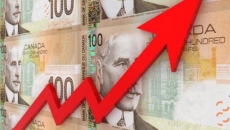OTTAWA - Canada's year-over-year inflation rate slowed to 7.6 per cent in July, with the deceleration largely driven by a decline in gas prices.
The inflation rate hit a nearly 40-year-high of 8.1 per cent in June, but economists were widely expecting inflation to have since slowed.
In its latest consumer price index report, Statistics Canada said the July saw the smallest monthly gains since December 2021.
It also marks the first decline in the key inflation rate since June 2020.
The federal agency said gas prices rose 35.6 per cent in July from the same month a year earlier, compared with June's whopping 54.6 per cent gain.
The agency said the downward pressure on prices at the pump was due to a combination of factors, including ongoing concerns related to a slowing global economy, increased COVID-19-related public health restrictions in China and slowing demand for gasoline in the United States.
But while gas prices declined, food prices at grocery stores rose at the fastest pace since August 1981, with prices up by 9.9 per cent on a year-over-year basis compared with 9.4 per cent the previous month.
Tu Nguyen, an economist with accounting and consultancy firm RSM Canada, said despite the decline in gas prices, the "pervasiveness" of inflation across the economy means there's still a ways to go before pressure on Canadians' finances eases substantially.
"It will be a while until households can breathe a sigh of relief. Wage growth continues to lag inflation, resulting in households losing purchasing power," Nguyen said in a note.
Average hourly wages rose by 5.2 per cent in July compared with a year ago.
Bakery goods are up 13.6 per cent since last year amid higher input costs as the Russian invasion of Ukraine continues to put upward pressure on wheat prices. The prices of other food products also rose faster, including eggs, which are up 15.8 per cent, and fresh fruit, up 11.7 per cent since last year.
As mortgage costs increase with higher interest rates, the report notes rent prices are accelerating, rising faster in July than the previous month.
With more Canadians travelling during the busy summer season, airfares rose by around 25 per cent in July compared with the previous month. Traveller accommodation prices rose by nearly 50 per cent since a year ago, with the largest price increases in Ontario.
As countries around the world struggle with skyrocketing prices, there are some signs inflation is beginning to ease, with the U.S. seeing its inflation rate decline in July as well.
Still, inflation is well above the Bank of Canada’s two per cent target.
The central bank is watching the latest reading of inflation as it gears up to make its next key interest rate on Sept. 7, when it’s expected to raise borrowing rates again.






